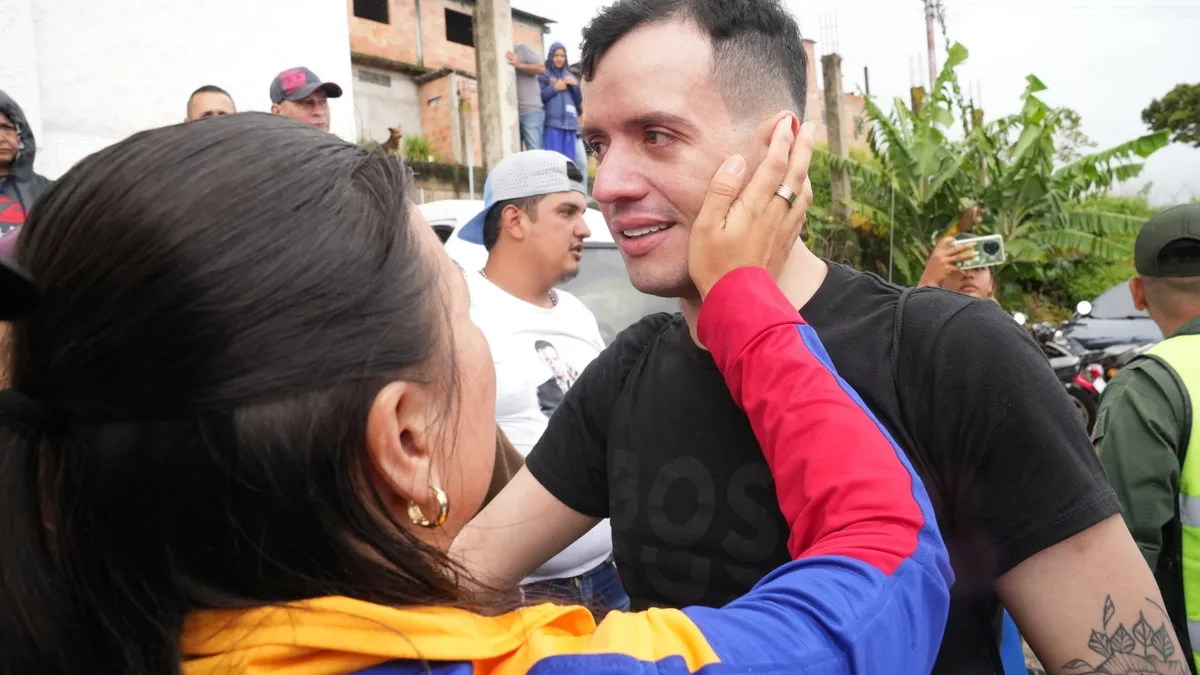
Carlos Daniel Terán, a 19-year-old Venezuelan, vividly recalls the chilling words of a prison warden upon his arrival at El Salvador's infamous mega-prison, CECOT. “You are never going to leave this place,” the warden ominously informed him. This encounter took place in March 2023 when Terán was transferred from an immigration detention center in Texas to the Centro de Confinamiento del Terrorismo, a maximum-security facility designed to detain alleged gang members from El Salvador. Formerly, the country’s justice minister had stated that the only way out of CECOT was in a coffin.
Terán found himself among many Venezuelans deported to El Salvador under the Trump administration, utilizing the rarely-invoked 1798 Alien Enemies Act. These individuals were accused—without any substantial evidence—of being affiliated with the Venezuelan gang known as Tren de Aragua. For nearly four months, the U.S. government concealed the identities of these deportees, preventing them from communicating with their families or seeking legal assistance. Recently, Terán and over 250 other Venezuelan detainees were released as part of a prisoner exchange between the United States and Venezuela. Reflecting on his ordeal, Terán shared with NPR, “I thought this was going to be the last experience of my life. I thought I was going to die there.”
Since their release, Terán and fellow former detainees have described the horrific conditions they faced at CECOT. They recounted experiences of violence, sexual abuse, inadequate nutrition, and overall inhumane treatment. NPR has been following Terán’s case since he was apprehended by ICE in Texas in February. Despite entering the U.S. legally through the Biden-era CBP One program, Terán has no criminal record and vehemently denies any ties to gang activity. His only past offenses occurred in Chile as a minor and involved charges of gun possession and drug-related offenses.
For Terán, the despair of incarceration was compounded by the lack of communication with his family. “I felt really sad—I spent my birthday there, and it was hard to not get a call from my family,” he expressed. Conditions within the prison were dire; prisoners were seldom permitted to leave their cells, and the meager diet consisted primarily of beans, tortillas, and rice. Furthermore, the sanitation facilities were often clogged, and the absence of air conditioning made the oppressive heat unbearable. Prisoners had limited access to bathing facilities, and the only water available was from tanks within their cells, accessible just once a day.
Terán and other detainees described the violence inflicted upon them by the guards as the most traumatic aspect of their imprisonment. Andry Hernandez, another detainee recently released, reported that guards routinely beat prisoners with batons or would drag them to a small, isolated cell known as La Isla ("The Island") for even more severe abuse. Hernandez, who is openly gay, recounted an incident where he was beaten by masked guards after being caught bathing outside designated hours. This brutal treatment included forced sexual acts.
“CECOT was hell on Earth,” Hernandez stated. The prison opened in January 2023 as part of President Nayib Bukele's aggressive anti-gang initiative, but it has remained largely shielded from outside examination, with the government tightly controlling its image through polished videos and staged visits. The recent releases of the Venezuelan detainees mark a rare opportunity for former inmates to publicly share their experiences.
Inside CECOT, prisoners had no access to books aside from Bibles and were allowed limited time outside their cells to play soccer or participate in prayer sessions led by an evangelical pastor who was also incarcerated. Hernandez noted that the guards demanded silence, which was difficult for the Venezuelan detainees known for their lively spirit. “By nature, we Venezuelans are a happy people who are accustomed to joking around, even in dire conditions,” he explained.
Andres Morales, another former detainee, recounted the initial months filled with despair. He revealed that a hunger strike ensued shortly after their arrival, demanding contact with family members and information about their cases. As desperation grew, some detainees resorted to a blood strike, using makeshift tools to inflict self-harm and write “SOS” on the walls with their blood. “We were treated like bargaining chips,” Hernandez lamented, emphasizing the lack of due process.
The Trump administration had allocated $6 million to El Salvador to detain these Venezuelan men, labeling them as members of the Tren de Aragua gang without presenting any evidence. The Department of Homeland Security has not addressed the specific allegations made by the detainees, with officials continuing to assert their gang affiliations without substantiation. Critics, including Noah Bullock, executive director of Cristosal, a Salvadoran human rights organization, have condemned the treatment of these Venezuelan prisoners as tantamount to torture.
Bullock highlighted that many of the detainees had no criminal records, with Cristosal’s research showing that less than 10% had prior offenses. Tragically, over 400 prisoners have died in Salvadoran custody since President Bukele declared a state of emergency in March 2022, which suspended key due process rights, enabling authorities to hold suspects indefinitely without allowing communication with legal representatives or family members. “These individuals never had a trial and were sent to a foreign country to endure indefinite imprisonment in harsh conditions,” Bullock stated.
As the plight of Carlos Daniel Terán and other former detainees comes to light, their stories serve as a stark reminder of the urgent need for reform in immigration policies, legal protections, and human rights standards across borders.